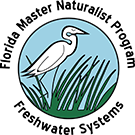


October 2 - November 6, 2025, 2025
Registration closes at 10:00 am on September 26, 2025
(Course Code: fs25-08)
Charlotte Harbor Event & Conference Center (CHECC)
75 Taylor St, Punta Gorda, FL 33950
Punta Gorda Library
401 Shreve St, Punta Gorda, FL 33950
Centennial Park Recreation Center
1120 Centennial Blvd, Port Charlotte, FL 33953
Lead and Point of Contact: Kate Rose, Florida Sea Grant Agent
Organizations: UF/IFAS Florida Sea Grant
Phone: 941-764-4346
Email: kate.rose0210@ufl.edu
Website: sfyl.ifas.ufl.edu/charlotte/florida-master-naturalist-program/
Associates: Cathy Tucker, Florida Sea Grant Program Assistant; and Mark Williams, Charlotte Harbor Ambassador
Open the PDF below to view the full agenda for this course.
• An interpretive 3-minute presentation and a group project reflecting on what you have learned about freshwater ecosystems are requirements for this class. We will discuss these requirements on Day 1 and will provide the support necessary for this to be a comfortable, successful experience for you. Assignments are not meant to be “graded” homework, but rather an opportunity for you to demonstrate your knowledge.
• Please plan for enough time to complete these requirements outside of class.
Attendance Policy:
Make-up time frame: If you miss a class or a field trip, you must make-up the same material. The time for makeup needs to be completed within a week when possible. This will keep you from getting behind, as much of the material builds upon itself.
Classroom Presentations: We will be meeting at a variety of locations throughout Charlotte County, please pay close attention to the schedule. Instructors will provide detailed directions via email prior to each class. Please contact your instructor if you have any questions. The classroom might be warm or cool dependent on the hosting venue—please, dress accordingly.
Field Trip Locations & Times: Activities and times may change due to unforeseen circumstances. It is the student’s responsibility to verify the field trip information for each class. Transportation and lunches are not included.
Course Time Schedule: You should arrive at the designated location (classroom or field trip) prior to the time listed on the agenda. The time listed on the agenda is the start time for the activity.
Student Carpooling is Suggested: This is up to the students to arrange.
Flexible Schedule:
• The schedule times listed are as close as possible, however, class participation & unforeseen circumstances may alter our plans. Please be flexible.
• We will try to stick to the listed times, but please arrange your schedule so that the class can be flexible.
Food & Drinks: Food and drinks are allowed in the classroom. Lunch is on your own, but we are often in the field, so it is best to bring your food and beverages with you. Please do not bring single use plastic containers (including Styrofoam) or disposable water bottles, drink cups or cutlery.
Cell Phones: Cell phones are fine to use outside of class. Please don’t allow them to ring during classroom sessions or on field trips and keep your usage to a minimum during class time. We know everyone has busy lives, but please try to give the instructors your full attention.
Field Trips:
• Water is Required to be Carried with You – No Exceptions.
• Attire: Layered clothing always works best. Prepare for field trips with long sleeves and pants, hiking boots or appropriate footwear, hat, sunglasses, sunscreen, and insect repellent (especially on feet/legs). It might be very hot or cold, or wet on our field trips—please, dress accordingly.
• Close-toed Shoes Are Required. Uneven terrain and the threat of thorns, poison ivy, and fire ants make close-toed shoes a must for all field trips.
• What to Bring: Water, snacks, field ID books, notepad and pen, binoculars, insect repellent, towel, and an optional change of clothes (spare shoes/socks/pants/shirt).
• Don’t wear perfume/cologne or use perfumed soap/body lotion before going out in the field. This may attract unwanted buzzing invertebrates such as mosquitoes.
• Always watch where you are putting your hands and feet to avoid less than pleasant interactions with wildlife such as snakes and fire ants.
• While we strive to maintain a manageable pace on our field trips, students should expect to be on their feet (either standing or walking in the field) for up to three hours.
Please Note: Recommend using a tablet, laptop, or PC with Chrome and/or Firefox installed when viewing and registering.
Have any questions? Please read through our Frequently Asked Questions page.